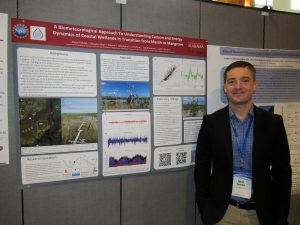
A graduate student in The University of Alabama Department of Biological Sciences has been awarded a National Science Foundation Graduate Research Fellowship.
David R. Yannick, from Orlando, Florida, is studying the biogeochemistry of wetlands in his graduate program at UA. He is one of 2,500 NSF Graduate Research Fellows selected for 2023. Yannick’s award is for $147,000 over three years, which includes a stipend and education support cost to UA.
“It enables me to continue pursuing my research interests in biogeochemistry and wetland ecosystems,” Yannick said. “I am also grateful for the support in my graduate training thus far from my co-advisors, Drs. Gregory Starr and Christina Staudhammer, and the Department of Biological Sciences.”
Since 1952, NSF has provided fellowships to individuals early in their careers based on their demonstrated potential for significant achievements in science and engineering.
The ranks of NSF Fellows include individuals who have made breakthroughs in science and engineering research and become leaders in their fields.
The NSF Graduate Research Fellowship Program is part of NSF’s overall strategy to develop a globally engaged work force necessary to ensure the nation’s leadership in advancing science and engineering research and innovation.
By underwriting the training of graduate students that demonstrated potential to be high-achieving scientists and engineers, the Graduate Research Fellowship Program represents long-range investments for the future of society, according to the NSF.
Yannick will graduate in fall 2023 with his master’s degree. He will continue working on his Ph.D. at UA while being mentored by Starr, an Alabama Water Institute Distinguished Faculty Fellow.
Yannick graduated from the University of Central Florida in 2021 with a B.S. in environmental studies. He completed independent undergraduate research with Dr. Lisa Chambers in her aquatic biogeochemistry lab, where he also served as lab manager before arriving at UA.
Yannick is also a recent recipient of the Department of Biological Sciences Ecology and Evolution Research award. He also won second place for showcasing his research at the 2023 AWI Symposium poster contest.
Yannick’s research at UA involves studying the carbon dynamics of coastal wetlands in the Florida Everglades. Altered hydrology has increased susceptibility to saltwater flooding and natural disturbances like hurricanes. This can lead to several issues such as shifts in soil respiration, peat collapse, plant mortality and the establishment of salt-tolerant vegetation such as mangroves. These events can lead to a transitional state where there is a change in dominant vegetation and eventually a different ecosystem.
Yannick and his fellow researchers seek to understand how carbon is being stored or released from these wetlands during this transitional phase as they have observed a departure from herbaceous marsh and the beginnings of a mangrove forest. They utilize an eddy-covariance flux tower that continuously measures CO2 and CH4 emissions and other important biological and meteorological parameters. This is important as wetlands provide invaluable services from providing crucial habitats to storing carbon.
“As a researcher, I am excited to explore how the lessons learned from the Everglades can be applied to coastal wetlands under pressure, also in Alabama and beyond,” he said. Along with Yannick, Jacob Wall, who graduated in December 2022 with a master’s degree in metallurgical engineering from UA, was also selected for the NSF Graduate Research Fellowship. Wall was previously awarded a Goldwater Scholarship in 2021.